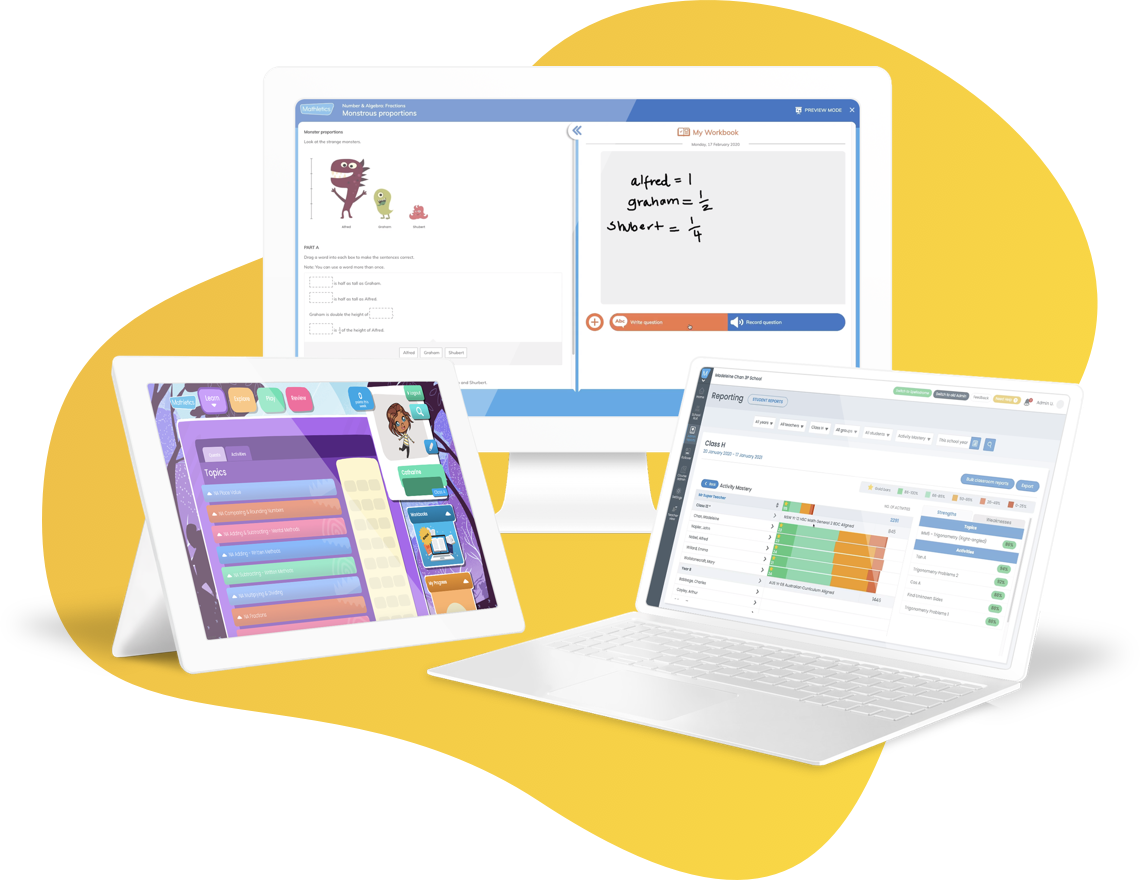
Lessons rarely go as planned. How we imagine their delivery, student reaction, and the gift of knowledge we leave as the bell rings out, is a warm and delightful fiction.
Problem-solving and reasoning (PSR) lessons are no exception.
Putting together a multi-part activity combining the science of mathematics, the art of storytelling and intuition of a teacher is a feat. Pulling it off requires practice, practice, practice.
Here’s how we imagine our PSR lessons to play out, and the answering laughter of reality.
Expectation: My problem is rock-solid
You’ve thought of, borrowed, or been inspired by a problem you’ve seen elsewhere. A friend or colleague has told you it’s the bee’s knees – just the right amount of challenge, easy to understand and provides a seamless question to question experience.
Reality: You stumble on the unexpected
A student makes a point you weren’t prepared for, the question doesn’t make sense in context, or you haven’t accounted for a style of answer.
You stutter, stress, fluster and momentum evaporates.
Thus ends your PSR lesson.
You can avoid stumbling by getting prepared. However fault-free your problem seems, run through it a few times to see where you or your class might trip up.
Expectation: My lesson will engage every student from start to finish
What you’re bringing to the table is entertaining enough to spawn its own Netflix series. It has a little something for everyone. Every eye in the class will sparkle, every mind ignited and dedicated to the task at hand.
Reality: Your students want to be outside
Your prompts are met with glassy eyes, several students have been lost to random doodling, and the students who aren’t confused are bored.
You can engage students by stoking their curiosity. Connect the problems to your students, and you’ll have them hooked from intro to ending. Here are a few shortcuts:
Play to your passions – your excitement is contagious, and you’ll bring more energy to a problem that means something to you.
Continually raise the stakes – every great adventure starts humbly and explodes in its finale. Keep building and so will the incentive to follow.
Sprinkle in confusion – getting students off-balance will challenge them to find their feet again. Ask questions that seem to undermine what they’ve just learned, or throw them an entirely new approach that forces them to rethink.
Expectation: My questions will land perfectly
Your queries will be met with enthusiastic whispers and set the class into frenzied thought. Neurons will fire like the lighting of the galaxy and your students answers will propel your PSR lesson further onward into the great expanses of the unknown.
Reality: You get impatient and give students the answer
Silence meets your prompts and you break before your students begin to work on the problem. You give the answer, striking out the ‘S’ in ‘PSR’.
Try to ask the right questions at the right time. When creating your PSR journey, find the definitive moments where a question or series of questions are going to benefit your students most. Think about how the questions can improve their base knowledge, challenge them to think further or help them consider the problem in a new light or with a deeper understanding.
Expectation: My class will work seamlessly in groups
‘Alright, get into groups of 4’ begins the lesson and students are arranged, seated and waiting before the second hand has spun a full revolution. Students help and learn from one another, using their unique understanding and abilities to make learning work for everyone involved.
Reality: Your class is a miniature society on the verge of anarchy
‘Alright, get into groups of 4’ begins the lesson and is followed by immediate chaos. The class isn’t divisible by 4, friends refuse to sit anywhere but with each other, and the ability spectrum is wider than a waterfall’s rainbow.
Know how you want to group your class and activity. Avoid student politics, stress and ability pairing by thinking about what type of grouping will benefit the activity. To encourage discussion, you might seat groups of friends, generate debate by throwing random students together, or give students different roles to fill and work as small parts in a larger system.
Expectation: My lesson will run exactly on time
You’ve got a good idea of how long the lesson will take, as well as how and when to move on to the next segment. The lessons goals will be met by the time the clock strikes for break.
Reality: The clock betrays you with feline ruthlessness
You find yourself yelling the last part of the activity over the bell. The intro took twice as long as expected, the middle was rushed, and the conclusion will have to be brought up in the next lesson.
Give yourself double the time. Framing, hidden issues and post-class discussion are guaranteed to blow the lesson out. Having more time up your sleeve allows you to be flexible with your lesson and give students (not to mention yourself) the chance to reflect what was learned in class.
Be sure to have some reflecting tools/scaffolds or extension activity that deepens understanding for students who do finish early to ensure there is no time wasted.
Expectation: The next PSR lesson will be even better
The lesson was a success and the next one is going to be bigger and better.
Reality: You can’t remember what happened last time
You remember too late the mistakes of PSR lessons past. If only you took notes from the last time this happened.
Take notes as soon as your PSR lesson has finished. To make sure the next time is better, bigger and bolder, take notes. Jot down what worked, what didn’t, how students reacted and what you think might need to be tweaked, reworked or thrown out for next time.
Reality can be harsh, but it will prepare you for creating some unforgettable learning experiences.
Keep these tips in mind, and your warm fiction will become a regular reality.
Need help teaching problem-solving and reasoning?
We’ve got you covered – check out 3 great examples of problem-solving and reasoning (and one bad one) or check out our teacher-favourite range of downloadable mathematics activities.



